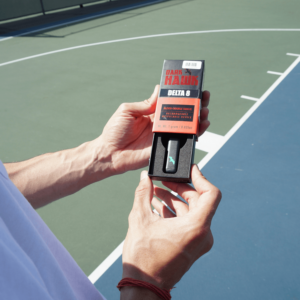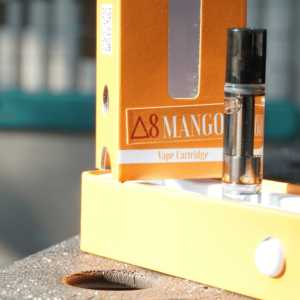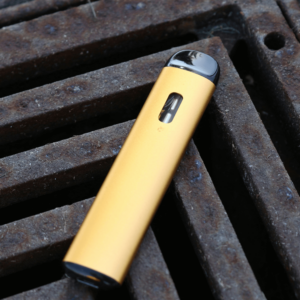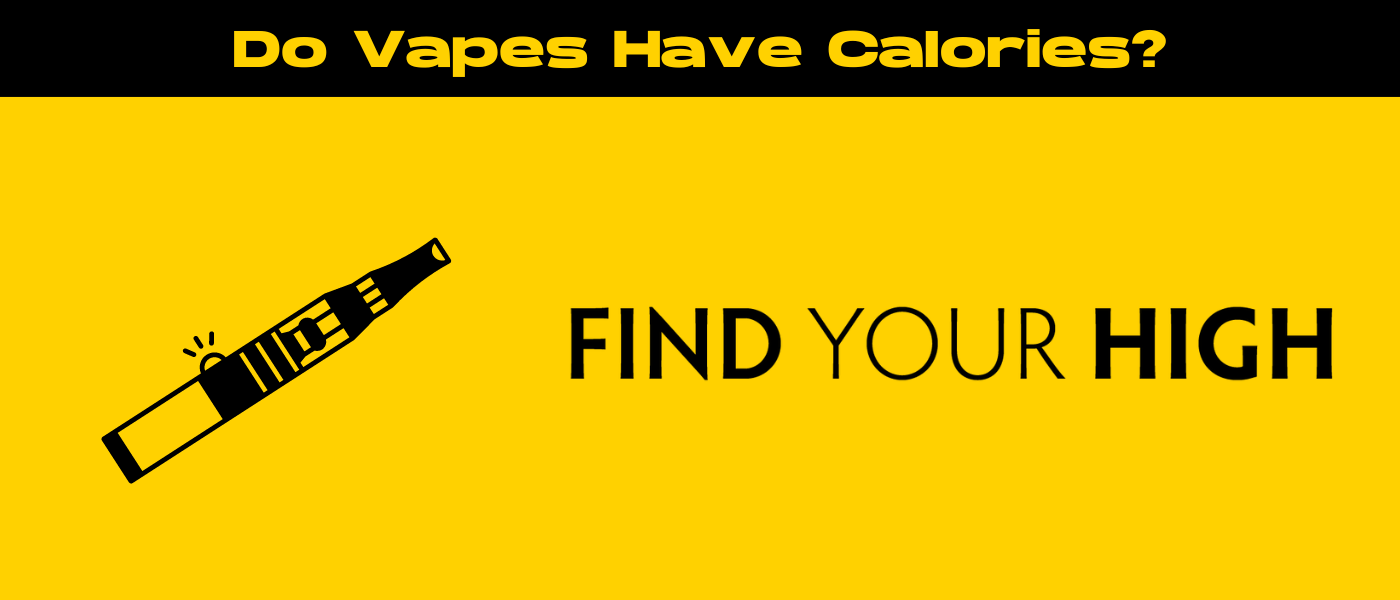Cannabis vapes are some of the most popular products on the market, offering a discreet and potentially healthier alternative to smoking. With the rise of THC and CBD products, many people are curious about what goes into their vape pens—and whether vaping cannabis could contribute to their daily caloric intake. So, do vapes have calories?
In this blog, we’ll address whether cannabis vapes contain any calories, what those calories might come from, and whether vaping cannabis could impact your weight or health in any meaningful way.

What Are Cannabis Vapes and How Do They Work?
Cannabis vapes are devices that heat cannabis oil or distillate to produce vapor, which is then inhaled by the user. Unlike smoking, which involves combustion, vaping uses heat to turn liquid (vape juice or cannabis oil) into vapor without burning the plant material. This can be less harsh on the lungs and potentially reduce the exposure to harmful chemicals found in smoke.
Cannabis vape pens typically contain concentrated forms of THC (tetrahydrocannabinol), CBD (cannabidiol), terpenes, and sometimes other additives like flavoring agents. The device works by heating the vape oil to a specific temperature that turns the liquid into vapor, which you then inhale.
Because cannabis vapes are concentrated, a smaller amount of vapor is needed to achieve the desired effect, making them a convenient way to consume cannabis.
What Ingredients Are in Cannabis Vape Cartridges?
Cannabis vape cartridges usually contain a combination of active cannabinoids, terpenes, and carrier oils. These ingredients are essential for delivering the desired effects and flavor. Here’s a breakdown of what’s typically inside:
- THC/CBD: These are the active ingredients responsible for the effects of cannabis. THC produces a psychoactive “high,” while CBD offers potential therapeutic benefits without the high. Neither THC nor CBD contains any calories.
- Terpenes: These natural compounds found in cannabis are responsible for the aroma and flavor of the vape. Terpenes also have minor therapeutic effects, but they don’t contribute calories.
- Carrier Oils: Carrier oils are often used to dilute concentrated cannabis extracts, making them suitable for vaping. Common carrier oils include:
- Vegetable Glycerin (VG): A sugar alcohol often used in cannabis vape cartridges to create thicker vapor.
- MCT Oil (Medium-Chain Triglycerides): A type of oil derived from coconut or palm oil, used to dilute cannabis concentrates for smoother vapor production.
- Additives: Some cartridges may contain additional ingredients like flavoring agents, preservatives, or thinning agents to adjust the viscosity of the oil. These ingredients may not add significant calories but can contribute to the overall content of the vape juice.
Do Cannabis Vapes Have Calories? The Science Behind It
Now, let’s directly address the question: Does vaping have calories?
The answer is yes—but only in a very small amount. The primary source of calories in cannabis vapes comes from the carrier oils used in the vape juice, particularly vegetable glycerin (VG) and MCT oil. These oils are known to have caloric content, though the amounts used in cannabis vapes are so small that they won’t significantly affect your overall caloric intake.
It’s also worth noting that our bodies absorb calories through eating or drinking, not vaping.
- Vegetable Glycerin (VG): VG is a sugar alcohol that is commonly used in cannabis vapes for its ability to create thick clouds of vapor. VG has approximately 4 calories per gram. However, the amount of VG in a typical cannabis vape cartridge is minimal, meaning the total caloric intake from VG is negligible.
- Proylene Glycol: Propylene glycol is another common ingredient used in cannabis vapes. It helps thin the vape oil and contributes to the throat hit that some users enjoy. While PG has a small amount of calories (about 4 calories per gram), the amount used in vape cartridges is very small, so its caloric contribution is minimal.
- MCT Oil: MCT oil is another common carrier oil in cannabis vapes, especially in higher-end products. MCT oil contains about 8.3 calories per gram. Like VG, MCT oil is used in small amounts, and the calories it contributes are also insignificant in the context of your daily caloric intake.
- THC/CBD: Neither THC nor CBD contains calories. These active ingredients in cannabis provide effects but not energy or calories.
In short, while cannabis vapes do technically have a small amount of calories from VG or MCT oil, the amount is so small that it is unlikely to have any meaningful impact on your daily caloric intake or weight.

Caloric Impact: How Cannabis Vaping Compares to Other Activities
If you’re concerned about the caloric content of cannabis vapes, it’s helpful to compare it to other common activities and food sources:
- Eating a Snack: A small candy bar, for example, can contain around 200-300 calories, which is far more than the tiny number of calories in a cannabis vape. The amount of calories from VG or MCT oil in a vape cartridge is negligible in comparison.
- Exercise: Vaping cannabis will not contribute to burning calories in the way that physical activity does. On the other hand, an average 30-minute brisk walk can burn around 150-200 calories, significantly more than the calories in a vape.
Ultimately, the small number of calories in cannabis vapes is unlikely to have any impact on your daily calorie count. If losing weight is your goal, vaping cannabis or even vape juice flavors is not a significant caloric intake.
The Role of Carrier Oils in Cannabis Vapes
Carrier oils like VG (vegetable glycerin) and MCT oil are essential for making cannabis concentrates suitable for vaping, but they also contribute to the caloric content. Here’s a deeper look at these oils:
- Vegetable Glycerin (VG): VG is a sugar alcohol that, while low in calories compared to traditional sugars, still provides around 4 calories per gram. VG is favored in cannabis vape cartridges for its ability to create thick vapor clouds, but the amount used in each cartridge is so small that it has minimal impact on your overall calorie consumption.
- MCT Oil (Medium-Chain Triglycerides): MCT oil, often used for smoother vapor and better absorption of cannabinoids, contains approximately 8.3 calories per gram. Like VG, MCT oil is used in small quantities, so its caloric impact is also minimal.
While these oils add some calories, they are essential for the proper functioning of the vape cartridge. Without them, the concentrated cannabis oil wouldn’t vaporize properly.
However, it’s important to note that the amount of carrier oil in a typical cannabis vape cartridge is so low that the caloric content is negligible, especially when compared to foods or drinks.
Vaping and Weight Loss: Does It Help or Hurt?
Some people may believe that vaping cannabis—especially with THC—could help with weight loss or weight management. The reasoning often stems from THC’s effect on appetite, which can either suppress or increase hunger, depending on the individual.
- THC and Appetite: While THC is known to cause the “munchies,” or increased appetite, it doesn’t directly help with weight loss. In fact, THC’s appetite-stimulating effects could lead to overeating, which may result in weight gain for some users.
- CBD and Weight Loss: CBD, on the other hand, is sometimes touted as an appetite suppressant or metabolism booster. However, the research on CBD’s impact on weight management is still in its early stages, and it’s not a reliable method for weight control.
Despite the potential effects of THC on appetite, vaping cannabis should not be seen as a solution for weight management. The caloric content in cannabis vapes is minimal, so it won’t contribute to significant weight changes, either positive or negative.
For those trying to lose weight, focusing on a balanced diet and regular exercise is far more effective than relying on cannabis.

Conclusion: Do Vapes have Calories—The Bottom Line
So, do cannabis vapes have calories? Yes, but the amount is negligible. The tiny number of calories in cannabis vapes comes from the carrier oils—VG and MCT oil—which are used to make the concentrate suitable for vaporization. However, the calories in these oils are so small that they won’t significantly affect your daily caloric intake or contribute to weight gain.
Cannabis vapes should not be considered a source of calories or a method for weight control. The health concerns surrounding cannabis vapes are more focused on the potential effects of inhaling vaporized substances, rather than the caloric content. If you’re concerned about your weight, focusing on a balanced diet and exercise routine is far more effective than worrying about the calories in your vape.
While cannabis vaping may not add much to your calorie count, it’s important to be aware of the health risks associated with vaping, including potential lung issues. Always choose high-quality, lab-tested products, and use cannabis responsibly.

Frequently Asked Questions
1. Do you gain calories from vaping?
Vaping itself does not significantly contribute calories. While some vape juices may contain small amounts of calories from ingredients like vegetable glycerin (VG) or MCT oil, these are negligible and unlikely to affect your overall caloric intake.
2. Do I gain weight from vaping?
Vaping alone does not directly cause weight gain. However, vaping cannabis (especially THC) can increase appetite (“the munchies”), potentially leading to overeating, which could contribute to weight gain if not managed. The calories in vape juice itself are minimal.
3. How many calories are in a hit of a vape?
The number of calories in a single hit of a vape is negligible. The tiny amounts of carrier oils like VG or MCT oil used in vape juice contain very few calories, but this is not enough to have any significant impact on your daily caloric intake.
4. Will vaping break my fast?
Vaping does not technically break a fast, as it doesn’t introduce significant calories into your system. However, if you’re fasting for health reasons and the vape juice contains nicotine or other stimulants, it could affect your metabolism or insulin levels, potentially interfering with the fasting process.
4. Can you vape THCA flower?
Yes, you can vape THCA flower, but doing so heats the compound, converting THCA into THC. This process produces psychoactive effects, unlike consuming it in its raw form, which remains non-psychoactive.





